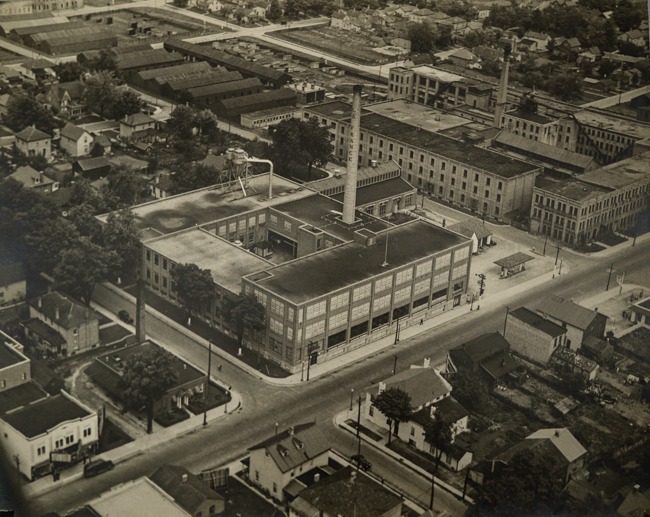The 40-Day LaFrance Textiles Strike
The 40-Day LaFrance Textiles Strike
On February 28th in 1938, the employees of La France Textiles in Woodstock, Ontario, went on strike when the company refused to recognise the labour union and workers’ demands for certain regulations outlined by the Industry and Labour Board to be met. This was during The Great Depression, when many people were struggling financially while there was no unemployment insurance, employee healthcare coverage, and minimal social assistance. Labour unions that were organized to attempt to improve the working and living conditions of employees across Canada were often suppressed by businesses and the government. However, this did not stop the workers at La France from taking action for their rights as employees.

Aerial view of the La France Textiles Plant in Woodstock, Ontario. Courtesy of Woodstock Museum N.H.S. (X1985.25.1)
Some of the demands of the Textile Union included:
- 10 percent hourly wage increase for male employees to meet the textile worker minimum wages internationally
- A minimum of 30.5 cents per hour for female employees
- A maximum work week of 48 hours
- Work in excess of those hours be paid at time and a half
- Work completed on weekends and holidays be paid at double
- Night shift operatives paid 10% higher than day shift
- Employer must pay wages on Friday every second week
- Employer must immediately install adequate ventilation in the facility
- Employer must provide adequate sanitary improvement necessary for the health and wellbeing of employees
- Employer shall instruct all supervisors to treat employees civilly with no discrimination on the part of either the employees and employers, either for or against membership in the Trade Union
- All employees employed for a minimum of 1 year shall receive 1-week paid holiday during the summer
Many of these "demands” were basic worker’s rights we take for granted today. The demands were submitted to the General Manager by representatives of the United Textile Workers’ Union No. 7. When La France Textiles refused to meet the demands, a strike was organized. The plant was shut down by management for a week but reopened a week later with 79 employees returning to work during the ongoing strike. The rest of the employees refused to return, and many picketed outside the plant on Dundas Street. Employees returning to work were heckled and threatened by the crowd. The crowd outside La France was not solely made up of actual employees, it was reported in the “Sentinel-Review” newspaper that workers laid off from Woodstock Rubber Co. Ltd. also joined in, as well as sympathizers who worked in industrial plants in nearby towns and cities. City Police supervised the picketers, and were augmented by Provincial Police from London, Ontario, and Provincial Constable Clark was also in attendance. Nailed to a tree outside the picket line were instructions that stated: “Picketers must keep moving, must not lay hands on anyone, and that they must not make threats or offer resistance to the police.”

A photo of the strikers on the front page of the Woodstock Sentinel-Review newspaper, 28 February 1938
The Provincial Department of Labour offered to act as a mediator between La France Textiles and its workers to reach an agreement; however, La France turned down the offer. La France published a piece in the newspaper defending the decision to refuse the demands stating that according to the International Labour Office’s 1937 Report, the highest paid textile workers in the world were in Canada and the U.S.A. They also stated that according to the Canadian Tariff Board: “hourly wages in Canada exceed those paid for corresponding occupations in the United Kingdom, by 55 to 60 percent in the woollen industry, 76 to 78 percent in the worsted spinning industry, and 65 to 75 percent in the worsted weaving industry.”
The strike lasted 40 days in total and, despite it beginning mostly peacefully, ended up being one of the most violent strikes in the City’s history with physical fights, six arrests, and even a large brawl between strikers, returned male workers, and police eventually taking place. After the violence began, the police escorted returning La France employees to and from the plant in cars to avoid further altercations. The strike made provincial and national news and was monitored by the Royal Canadian Mounted Police (RCMP). On March 1, 1938, the RCMP included the La France Textiles strike in their weekly report on “Communist and Fascist Organizations and Agitation in Canada”, a classified document at the time which has since been made publicly accessible.
After over a month of drama at the plant, the strike finally ended as the City refused to provide financial support to the strikers and their families. In order to feed their families and themselves, the striking employees were forced to return to work without an agreement being reached with the company.
